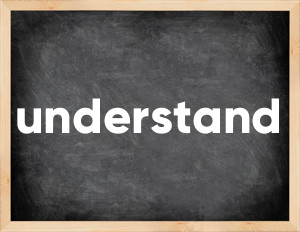 The English verb 'understand' is pronounced as [ʌndəˈstænd].
The English verb 'understand' is pronounced as [ʌndəˈstænd].
Related to:
irregular verbs.
3 forms of verb understand: Infinitive (understand), Past Simple - (understood), Past Participle - (understood).
Here are the past tense forms of the verb understand
👉 Forms of verb understand in future and past simple and past participle.
❓ What is the past tense of understand.
Understand: Past, Present, and Participle Forms
| Base Form | Past Simple | Past Participle |
|---|---|---|
| understand [ʌndəˈstænd] |
understood [ʌndəˈstʊd] |
understood [ʌndəˈstʊd] |
What are the 2nd and 3rd forms of the verb understand?
🎓 What are the past simple, future simple, present perfect, past perfect, and future perfect forms of the base form (infinitive) 'understand'?
Learn the three forms of the English verb 'understand'
- the first form (V1) is 'understand' used in present simple and future simple tenses.
- the second form (V2) is 'understood' used in past simple tense.
- the third form (V3) is 'understood' used in present perfect and past perfect tenses.
What are the past tense and past participle of understand?
The past tense and past participle of understand are: understand in past simple is understood, and past participle is understood.
What is the past tense of understand?
The past tense of the verb "understand" is "understood", and the past participle is "understood".
Verb Tenses
Past simple — understand in past simple understood
(V2).
Future simple — understand in future simple is understand (will + V1).
Present Perfect — understand in present perfect tense is
understood
(have/has + V3).
Past Perfect — understand in past perfect tense is
understood
(had + V3).
understand regular or irregular verb?
👉 Is 'understand' a regular or irregular verb? The verb 'understand' is irregular verb.
Examples of Verb understand in Sentences
- I'm not sure I understand what it means (Present Simple)
- We don't understand laws of nature (Present Simple)
- He's beginning to understand what's happened there (Present Simple)
- It gets harder and harder to understand you (Present Simple)
- I slept bad and it was hard for me to understand lessons (Past Simple)
- He hopes she will understand his intentions (Present Simple)
- It's okay if you don't understand me now (Present Simple)
- I think they understood it was not possible (Past Simple)
- I fail to understand his true aim (Present Simple)
- I hope you'll eventually understand and forgive me. (Future Simple)